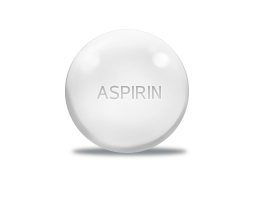 Aspirin
Aspirin

Aspirin is used to treat mild to moderate pain and to reduce fever or inflammation.
- Availability: In Stock (36 packs)
- Active Ingredient: acetylsalicylic acid
- Analogs of Aspirin
- Ascorbic Acid,
- Prevacid,
- Pepcid,
- Zyloprim,
- Aciphex,
- Prilosec,
- Protonix,
- Aggrenox Caps,
- Primaquine,
- Shallaki,
- Ponstel
Aspirin, 75mg
| Package | Per Pill | Savings | Per Pack | Order |
|---|---|---|---|---|
| 100 pills | $43.63 | Buy Now | ||
| 200 pills | $0.34 | $19.10 | $87.26 $68.16 | Buy Now |
| 300 pills | $0.30 | $39.62 | $130.89 $91.27 | Buy Now |
| 400 pills | $0.29 | $57.82 | $174.52 $116.70 | Buy Now |
| 500 pills | $0.29 | $74.67 | $218.15 $143.48 | Buy Now |
Aspirin (Acetylsalicylic Acid)
General information
Aspirin is in a group of drugs called salicylates. It works by reducing substances in the body that cause pain, fever, and inflammation. It is sometimes used to treat or prevent heart attacks, strokes and angina.
Directions
Take this medication with a full glass of water. Taking aspirin with food or milk can lessen stomach upset. Enteric-coated aspirin is specially formulated to be gentle on your stomach, but you may take it with food or milk if desired. Do not crush, chew, break, or open an enteric-coated or extended-release pill. Swallow the pill whole. The enteric-coated pill has a special coating to protect your stomach. Breaking the pill could damage this coating.
Precautions
Do not use this medication if you are allergic to aspirin, or if you have a recent history of stomach or intestinal bleeding; a bleeding disorder such as hemophilia; or an allergy to an NSAID (non-steroidal anti-inflammatory drug) such as Advil, Motrin, Aleve, Orudis, Indocin, Lodine, Voltaren, Toradol, Mobic, Relafen, Feldene, and others; if you are a child or teenager with influenza (flu) or chickenpox; have bleeding problems such as hemophilia, von Willebrand disease, or low blood platelets; you have active severe bleeding. Avoid drinking alcohol while you are taking aspirin. Alcohol may increase your risk of stomach bleeding.
Contraindications
Ask your doctor before using aspirin if you take an antidepressant such as citalopram, escitalopram, fluoxetine (Prozac), fluvoxamine, paroxetine, sertraline (Zoloft), trazodone, or vilazodone. Taking any of these medicines with an NSAID may cause you to bruise or bleed easily. Ask a doctor or pharmacist if it is safe for you to use aspirin if you are also using any of the following drugs: a blood thinner (warfarin, Coumadin, Jantoven), or other medication used to prevent blood clots; or other salicylates such as Nuprin Backache Caplet, Kaopectate, KneeRelief, Pamprin Cramp Formula, Pepto-Bismol, Tricosal, Trilisate, and others.
Possible side effect
The most common side effects are upset stomach, heartburn, drowsiness and headache. Stop using aspirin and call your doctor at once if you have any of these serious side effects: black, bloody, or tarry stools; coughing up blood or vomit that looks like coffee grounds; severe nausea, vomiting, or stomach pain; fever lasting longer than 3 days; swelling, or pain lasting longer than 10 days; or hearing problems, ringing in your ears.
Drug interactions
If you are taking aspirin to prevent heart attack or stroke, avoid also taking ibuprofen (Advil, Motrin). Ibuprofen may make this medication less effective in protecting your heart and blood vessels. If you must use both medications, take the ibuprofen at least 8 hours before or 30 minutes after you take the aspirin (non-enteric coated form). This medication may be harmful to an unborn baby's heart, and may also reduce birth weight or have other dangerous effects. Tell your doctor if you are pregnant or plan to become pregnant while you are taking this medication.
Missed dose
Since this medication is often used as needed, you may not be on a dosing schedule. If you are using the medication regularly, take the missed dose as soon as you remember. If it is almost time for the next dose, skip the missed dose and wait until your next regularly scheduled dose. Do not use extra medicine to make up the missed dose.
Overdose
In case if you think that you could be overdosed by Aspirin you should call for medical help immediately.
Storage
Store Aspirin at room temperature, between 68 and 77 degrees F (20 and 25 degrees C). Store away from heat, moisture, and light. Do not store in the bathroom. Keep in a tight, light-resistant container. Keep Aspirin out of the reach of children and away from pets.
Note
The information presented at the site has a general character. Note please this information cannot be used for self-treatment and self diagnosis. You should consult with your doctor or health care adviser regarding any specific instructions of your condition. The information is reliable, but we concede it could contain mistakes. We are not responsible for any direct, indirect, special or other damage caused by use of this information on the site and also for consequences of self-treatment.
 Over 1,000,000 Happy Customers
Over 1,000,000 Happy Customers
 Low Prices
Low Prices
 Fast Delivery
Fast Delivery
